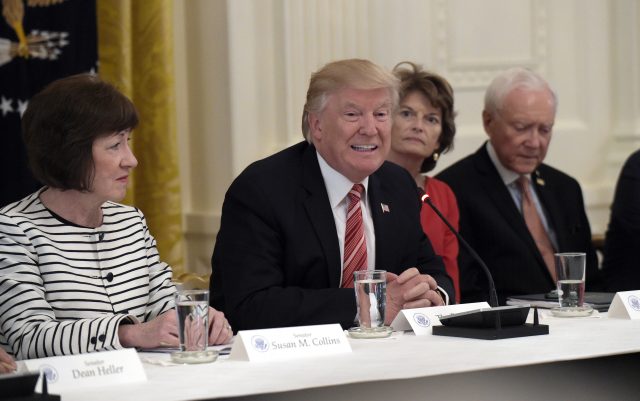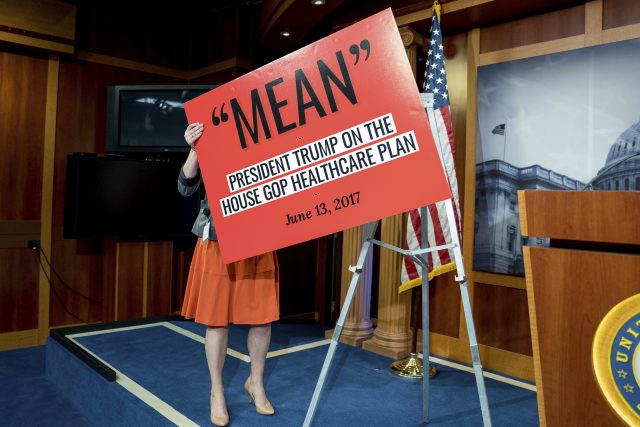
Senate Republican leaders have shelved a vote on their prized healthcare bill until at least next month, forced to retreat by a rebellion that left them lacking enough votes to even begin a debate.
“We will not be on the bill this week,” Senate majority leader Mitch McConnell told reporters in what was a remarkable reversal of plans to push one of President Donald Trump’s and the Republican Party’s top priorities through the chamber this week.
“But we’re still working towards getting at least 50 people in a comfortable place,” he said.
I’m deeply relieved that @SenateMajLdr delayed a vote on the @SenateGOP's bill to rip health care away from 22 million Americans.
— Elizabeth Warren (@SenWarren) June 27, 2017
But let’s be clear: The Republicans’ so-called “healthcare” bill comes back to life more often than the lead zombie in a horror movie.
— Elizabeth Warren (@SenWarren) June 27, 2017
.@SenateMajLdr says he'll get the votes he needs to repeal the Affordable Care Act. It’s still up to us.
— Elizabeth Warren (@SenWarren) June 27, 2017
We must keep fighting to save the Affordable Care Act & improve healthcare for American families.
— Elizabeth Warren (@SenWarren) June 27, 2017
That is the number of Republican senators who must back the bill for it to survive, with all Democrats opposed.
“We’ve got a lot of discussions going on and I’m still optimistic we’re going to get there,” he added.
Minutes earlier, Mr McConnell divulged the decision to Republican senators at a private lunch also attended by Vice President Mike Pence and White House chief of staff Reince Priebus.
Our job now is to make sure that 100% of the American people know what’s in the disastrous Republican "health care" bill. pic.twitter.com/YwkzXn2892
— Bernie Sanders (@SenSanders) June 27, 2017
Republican senators planned to travel to the White House later to meet with Mr Trump.
Mr McConnell had hoped to push the measure through his chamber before an Independence Day recess that party leaders fear will be used by foes of the legislation to tear away support.
The bill, which would roll back much of President Barack Obama’s healthcare law, has been one of the party’s top priorities for years, and the delay is a major embarrassment to Mr Trump and Mr McConnell.
At least five Republican senators – conservatives and moderates – have said they would vote against even beginning debate, and the bill would be derailed if just three of the 52 Republican senators voted against it.

Republican defections increased after Congress’s budget referee said on Monday the measure would leave 22 million more people uninsured by 2026 than Mr Obama’s 2010 statute.
Utah’s Mike Lee became the fifth Republican senator to oppose letting the chamber formally begin considering the proposal.
The Congressional Budget Office (CBO) analysis suggested some ammunition Republican leaders could use, saying the Senate bill would cut federal deficits by 202 billion dollars more over the coming decade than the version the House approved in May.
Mr Trump has called the House bill “mean” and prodded senators to produce a package with more “heart”.

The budget office report said the Senate bill’s coverage losses would especially affect people between the ages of 50 and 64, before they qualify for Medicare, and with incomes below 200% of the poverty level, or around 30,300 dollars for an individual.
The Senate plan would end the tax penalty the law imposes on people who do not buy insurance, in effect erasing Mr Obama’s so-called individual mandate, and on larger businesses that do not offer coverage to workers.
It would also eliminate 700 billion dollars worth of taxes over a decade, largely on wealthier people and medical companies – money that Mr Obama’s law used to expand coverage.


Comments: Our rules
We want our comments to be a lively and valuable part of our community - a place where readers can debate and engage with the most important local issues. The ability to comment on our stories is a privilege, not a right, however, and that privilege may be withdrawn if it is abused or misused.
Please report any comments that break our rules.
Read the rules here